|
|
|
Sort Order |
|
|
|
Items / Page
|
|
|
|
|
|
|
| Srl | Item |
| 1 |
ID:
118351
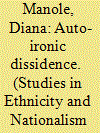

|
|
|
|
|
| Publication |
2012.
|
| Summary/Abstract |
This article analyses and compares the treatment of history in two dramatic re-enactments: the English Canadian 1837: The Farmers' Revolt, a collective creation of Theatre Passe Muraille with Rick Salutin as dramaturge, and the Romanian A Cold, by Marin Sorescu. Both plays re-enact past events as a form of anti-colonial and respectively anti-communist resistance and as a way to enable imagined exile, but their dramaturgical strategies and substance are necessarily different as each deals with a specific order of history.
|
|
|
|
|
|
|
|
|
|
|
|
|
|
|
|
| 2 |
ID:
118354
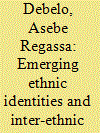

|
|
|
|
|
| Publication |
2012.
|
| Summary/Abstract |
The politics of ethnicity was formally institutionalised in Ethiopia in 1991 with the introduction of ethnic federalism. This study deals with emerging ethnic identities and the dynamics of the inter-ethnic relationship between the Guji and Burji peoples in south Ethiopia. The article argues that, following the enunciation of ethnicity as a leading political order in 1991, identities have been articulated in such a way that past historical incidents and memories have been reactivated and old labels have been redefined by ethnic entrepreneurs for various motives. This promotes (re)construction of ethnic identities and inter-group polarisation. In the Guji-Burji case, it is this fragile relationship that is easily changed into inter-ethnic conflict as a result of competing interests over resources. The article concludes that while the cause of the current Guji-Burji conflict is primarily economic in nature, it took on an ethnic dimension within the context of politicised ethnic identities that hardened group boundaries. Synchronising past relationships - both conflicting and harmonious - with the contemporary scenario, the article tries to shed some light on the dynamics of the Guji-Burji relationship, focusing particularly on the post-1991 political order in Ethiopia and its local implications.
|
|
|
|
|
|
|
|
|
|
|
|
|
|
|
|
| 3 |
ID:
118349
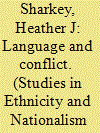

|
|
|
|
|
| Publication |
2012.
|
| Summary/Abstract |
Upon decolonisation, nationalist leaders in two North African countries, Algeria and Sudan, promoted a policy called Arabisation (ta'rib), which sought to impose standard literary Arabic at the expense of English (in Sudan), French (in Algeria), and other local languages (in both places). This language policy reflected the worldview of Muslim leaders, who hoped to break from the colonial past and start afresh while forging alliances with Arab Islamic states. Arabisation succeeded in expanding the use of literary Arabic in Sudanese and Algerian government bureaus as well as in schools and universities. However, in some circles it helped to stimulate oppositional identities that rejected pan-Arabism as a focal point for national pride and that challenged the cultural foundations of national cohesion. Taking a comparative approach, this study argues that Arabic language policy in Algeria and Sudan featured strongly in postcolonial nationalism and civil conflict. It concludes by considering the status of language cultures and policies today in Algeria, the Republic of the Sudan, and the newly independent Republic of South Sudan, and contends that state-led efforts at 'language rationalisation' have not eliminated multilingualism in practice.
|
|
|
|
|
|
|
|
|
|
|
|
|
|
|
|
| 4 |
ID:
118350


|
|
|
|
|
| Publication |
2012.
|
| Summary/Abstract |
Based on an interdisciplinary linguistic ethnography, I apply the term 'non-place' to the collective identity of a Slavic migrant congregation in the United States. Those members socialised into their faith before migration had already been marginalised in their resistance to the former national Soviet identity. The New Literacy Studies in particular help to describe their historic Protestant literacy practices regarding a sacred, and thus fixed, text. A fixed sacred text provided the freedom to interpret the group's context, a perceived narrative to join, and authority for leadership to dictate a way of life. Events around text were warm and welcoming, utilising Western texts for legitimatised scripture interpretation, and accessible to both Russian speakers and second-generation English speakers. With the assumed permanence of a sacred text, new believers retold their own narratives as part of the scriptural one, and had a 'home land' they had never stepped foot in.
|
|
|
|
|
|
|
|
|
|
|
|
|
|
|
|
| 5 |
ID:
118353
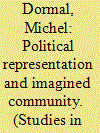

|
|
|
|
|
| Publication |
2012.
|
| Summary/Abstract |
Discussions of nation-building often focus on political elites, who are considered the makers of new communities. This article seeks to sketch out a different approach. It suggests thinking of representative relations as the site of a negotiation of collective identity. Drawing on recent discussions in political theory, the first part of the article discusses conceptual implications of this assumption, arguing that representation should be analysed in terms of its symbolic structure. The second part offers a historical case study of the Grand-Duchy of Luxembourg. It explores how processes of political democratisation and imagination of national community were deeply interconnected in the period from 1890 to 1939. The article illustrates how the representative politisation of social conflict may trigger nation-building.
|
|
|
|
|
|
|
|
|
|
|
|
|
|
|
|
| 6 |
ID:
118352


|
|
|
|
|
| Publication |
2012.
|
| Summary/Abstract |
This article analyses the way the concept of nation is reflected in film using the theory of cinematic nationhood and the method of relational constructivism. More specifically, it looks at how the nation can be legitimised when it occupies a strategic position within the national structure of fantasy and when it is closely associated with the most relevant commonplaces present within the social space. The article further investigates the situation in which the concept of nation loses legitimacy because of a change in the way it is imagined. The research addresses the case of Romania, choosing three films representing three distinct periods and characterised by different forms of political and economic organisation: communism, transition, and post-transition.
|
|
|
|
|
|
|
|
|
|
|
|
|
|
|
|
| 7 |
ID:
118355
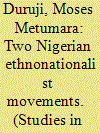

|
|
|
|
|
| Publication |
2012.
|
| Summary/Abstract |
The proliferation of ethnic militia organisations in Nigeria raises questions about the factors responsible for the development. Although reasons adduced from the rhetoric of these organisations point to the politics of exclusion and marginalisation in Nigeria, this form of ethnicity is a new phenomenon. The growth of these militant formations pervading the length and breadth of the country is attributable to the nature and character of the Nigerian state. Perceptions of marginalisation in the distribution of power and resources, and the repressive tactics of the state to sub-national dissent, have encouraged their growth. The Movement for the Actualization of the Sovereign State of Biafra (MASSOB) and the Oodua Peoples Congress (OPC) are prominent ethnic militia groups that draw membership from major ethnic groups in southern Nigeria. Rivalry and hegemonic competition for the control of the state among the major ethnic groups led to a civil war in the late 1960s, but wartime experiences were not harnessed for a nation-building project. The result was the systematic perversion of the state, which has resulted in throwing up new forms of ethnicity in Nigeria as reflected in the emergence of these organisations.
|
|
|
|
|
|
|
|
|
|
|
|
|
|
|
|
|
|
|
|
|